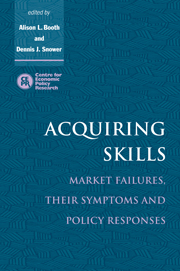1 - Introduction: does the free market produce enough skills?
Published online by Cambridge University Press: 16 November 2009
Summary
Are market incentives sufficient?
Does the free market provide people with adequate incentives for acquiring skills? This question has been the subject of unremitting interest to policy makers throughout the Western world. The answers are now a matter of great urgency.
The acquisition of human capital is recognized to be absolutely central to countries' growth performance. The ‘new growth theory’ has put it centre-stage. And rightly so. When people acquire skills they not only make themselves more productive, able to produce more output for a given amount of time and effort, they commonly also make themselves more adaptable. When tastes and technologies are changing rapidly, necessitating a high rate of labour turnover across industries and occupations, adaptability is crucial for keeping labour and capital employed and maintaining competitiveness.
When people acquire skills, they make each other more productive. Since most work is team work, my productivity generally depends on your productivity. The more training you have – on-the-job or off-the-job – the more I can learn from you about doing the job effectively, and the more productively the two of us can interact in production, innovation, distribution, and sales.
Beyond that, people who acquire skills make capital equipment more productive. They make more effective use of the machines they work with and they enable managers to introduce more sophisticated and productive machines. Without a workforce that is continuously acquiring new skills, it would be difficult to reap most of the returns from technological progress.
For all these reasons, the acquisition of skills is a vitally important activity.
- Type
- Chapter
- Information
- Acquiring SkillsMarket Failures, their Symptoms and Policy Responses, pp. 1 - 16Publisher: Cambridge University PressPrint publication year: 1996
- 7
- Cited by



